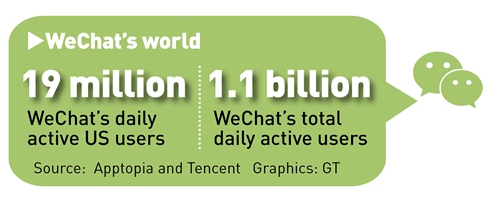SOURCE / INDUSTRIES
September deadline for WeChat ban may never be implemented: US lawyer
Deadline for WeChat ban may be revoked by US court: lawyer

A journalist experiences the mobile payment tool of Wechat Pay at a 7-Eleven convenience store. Photo: Xinhua
There is a likelihood that the September deadline the Trump administration has set for a WeChat ban will never be implemented, one of the initiators of the US WeChat Users Alliance, told the Global Times on Monday.
The alliance, initiated by several Chinese American lawyers and which represents WeChat users in the US, aims to rescind a presidential executive order targeting the Tencent-owned messaging app.
"Within the next 10 days we aim to simultaneously file several lawsuits in the federal courts in multiple jurisdictions around the US to maximize the impact," Zhu Keliang, managing partner of DeHeng Law Offices' Silicon Valley office revealed to the Global Times.
If the alliance succeeds in convincing the trial court to impose a temporary restraining order on Trump's executive order, the ban won't take effect until the court's order expires, according to Zhu.
"If we act quickly enough and convince the court to impose the restraining order, there is a likelihood that the September deadline will never see the light of day, and we may be able to force the government to either rescind the executive order or significantly narrow its scope," he adds.

Theoretically, lawsuits in the US can last for years, even at the trial court level. However, it may also be resolved in a matter of weeks following the alliance's filing of the lawsuit.
Take the Immigration and Customs Enforcement (ICE) lawsuit for example: the ICE issued a rule requiring international students to return to their home countries if they had only been offered online instead of in-person classes in the US. After Harvard and MIT took ICE to court, it retracted the rule almost instantly.
"We believe something similar could happen here, but no one can say for sure until we actually get there," Zhu reckoned.
The ICE case had a positive impact on a large number of international students from China, so it's a good example of how the alliance can use legal processes to right wrongs more efficiently, Zhu went on to say, disclosing that if the alliance loses the initial suit, it will immediately appeal to the higher court, including the US Supreme Court.
Trump signed an executive order on Thursday blocking all US transactions with Tencent after 45 days (September 20) on the grounds of it being "a threat" to national security. A parallel executive order signed on Thursday also bans all US deals with TikTok's Chinese owner ByteDance after the 45-day deadline.
However, cases whereby an executive order was suspended or revoked are not a rarity. In 2017, when President Trump issued his Muslim travel ban, a federal district court judge first granted a temporary restraining order to suspend the enforcement of the travel ban. Then the government appealed to the Ninth Circuit Court, which agreed with the district court judge. Shortly afterward the government revoked the travel ban, but issued a revised order that narrowed its scope. A new round of litigation followed and eventually reached the US Supreme Court in 2018.
The alliance has circulated a proposal for donor funding. If the case is resolved only at the federal district court level, it is estimated that the alliance would need about $100,000-$ 200,000, the lawyer said, adding that if appeals are required, then the alliance is looking at several hundred thousand dollars.

